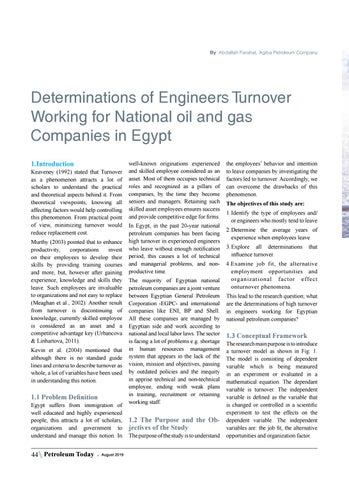By: Abdallah Farahat, Agiba Petroleum Company
Determinations of Engineers Turnover Working for National oil and gas Companies in Egypt 1.Introduction
Keaveney (1992) stated that Turnover as a phenomenon attracts a lot of scholars to understand the practical and theoretical aspects behind it. From theoretical viewpoints, knowing all affecting factors would help controlling this phenomenon. From practical point of view, minimizing turnover would reduce replacement cost. Murthy (2003) pointed that to enhance productivity, corporations invest on their employees to develop their skills by providing training courses and more, but, however after gaining experience, knowledge and skills they leave. Such employees are invaluable to organizations and not easy to replace (Meaghan et al., 2002). Another result from turnover is discontinuing of knowledge, currently skilled employee is considered as an asset and a competitive advantage key (Urbancova & Linhartova, 2011). Kevin et al. (2004) mentioned that although there is no standard guide lines and criteria to describe turnover as whole, a lot of variables have been used in understanding this notion.
1.1 Problem Definition
Egypt suffers from immigration of well educated and highly experienced people, this attracts a lot of scholars, organizations and government to understand and manage this notion. In
44 Petroleum Today
- August 2019
well-known originations experienced and skilled employee considered as an asset. Most of them occupies technical roles and recognized as a pillars of companies, by the time they become seniors and managers. Retaining such skilled asset employees ensures success and provide competitive edge for firms. In Egypt, in the past 20-year national petroleum companies has been facing high turnover in experienced engineers who leave without enough notification period, this causes a lot of technical and managerial problems, and nonproductive time. The majority of Egyptian national petroleum companies are a joint venture between Egyptian General Petroleum Corporation -EGPC- and international companies like ENI, BP and Shell. All these companies are managed by Egyptian side and work according to national and local labor laws. The sector is facing a lot of problems e.g. shortage in human resources management system that appears in the lack of the vision, mission and objectives, passing by outdated policies and the inequity in apprise technical and non-technical employee, ending with weak plans in training, recruitment or retaining working staff.
1.2 The Purpose and the Objectives of the Study The purpose of the study is to understand
the employees’ behavior and intention to leave companies by investigating the factors led to turnover. Accordingly, we can overcome the drawbacks of this phenomenon. The objectives of this study are: 1. Identify the type of employees and/ or engineers who mostly tend to leave 2. Determine the average years of experience when employees leave 3. Explore all determinations influence turnover
that
4.Examine job fit, the alternative employment opportunities and organizational factor effect onturnover phenomena. This lead to the research question; what are the determinations of high turnover in engineers working for Egyptian national petroleum companies?
1.3 Conceptual Framework
The research main purpose is to introduce a turnover model as shown in Fig: 1. The model is consisting of dependent variable which is being measured in an experiment or evaluated in a mathematical equation. The dependant variable is turnover. The independent variable is defined as the variable that is changed or controlled in a scientific experiment to test the effects on the dependent variable. The independent variables are: the job fit, the alternative opportunities and organization factor.





